As the saying goes: ‘An apple a day keeps the doctor away’, but can guinea pigs eat apples?
As a pet owner, it’s natural to want to treat your pet once in a while with a nutritious snack. A bit of fresh fruit won’t harm your guinea pig if you know which kind they can eat. Apples are one of those fruits that many people wonder if it’s safe to eat.
You may be one of these curious pet owners if you’ve stumbled upon this post. If so, rest assured because this informative guide tells you everything you need to know about the sweet fruit and your sweet pet.
Are apples safe for guinea pigs?
In short, yes. Apples are a safe option to give to your furball, but, like with most snacks and treats, it has to be given in moderation.
This means you should only give your full-sized guinea pig apple once or twice a week. If you choose to go twice a week, try to alternate your days, as they shouldn’t eat apples two days in a row.
Don’t try to give them a whole apple, as that will be too much for them and could pose a choking hazard. Instead, give them about a quarter of a cup of diced apples or two one-inch slices.
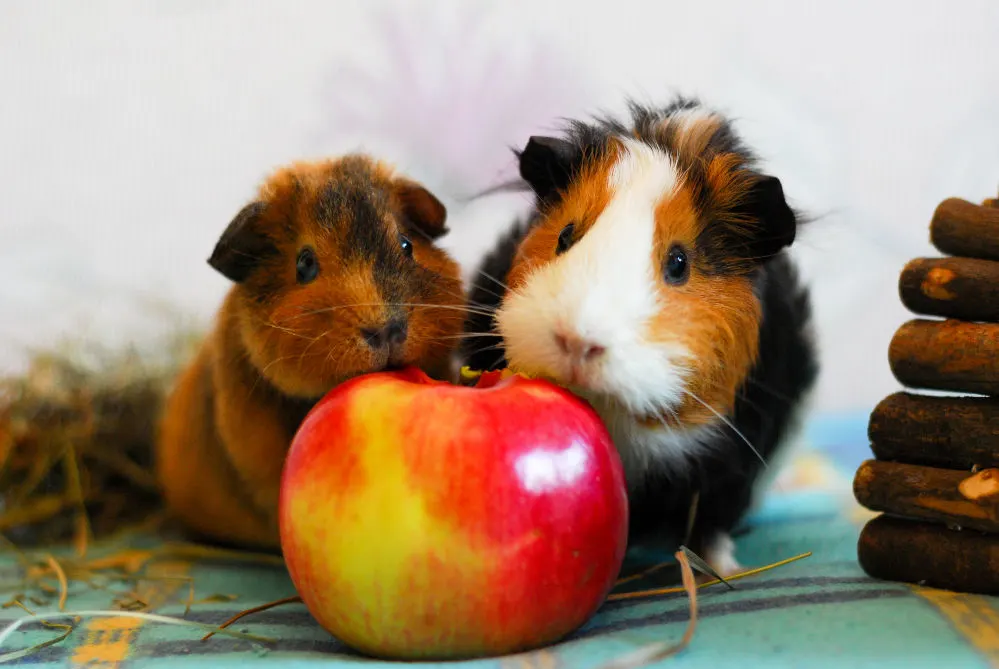
Note: Remove any extra pieces if they haven’t finished them in a few hours. Leaving moldy or rotten apples in their cage could make them very sick.
Possible risks
Like anything in life, you should be aware of a few possible risks and downsides when feeding your pet new foods. Monitor your piggy’s apple intake to see how they respond to it and look out for these possible health issues:
Stomach aches and diarrhea
It’s always best to gradually introduce your pet to any new foods. Feeding your guinea pigs too much apple too fast could cause havoc on their digestive systems, causing them significant discomfort. So, always start with small portions while keeping an eye on them.
High sugar content
Unsurprisingly, fruits have very high sugar content. And while a little bit of natural sugar is healthy for both humans and animals, too much of it can be harmful and cause diabetes. To avoid feeding your pet too much sugar through apples, stick to the portion sizes and don’t feed them apples more than twice a week.
Obesity
Too many sugary treats and little exercise can cause significant weight gain in your pet. The first signs of obesity in guinea pigs are if you can’t see their feet anymore and if you cannot feel their spine, ribs, or hip bones when you pick them up.
Are apples good for guinea pigs?
Now that we know that apples are a safe treat for your pet to eat once in a while, the next question is: are they good for the furry little guys? Well, yes. Apples are good for your guinea pig and have great health benefits. Let’s look at the nutritional value of apples in a guinea pig’s diet.
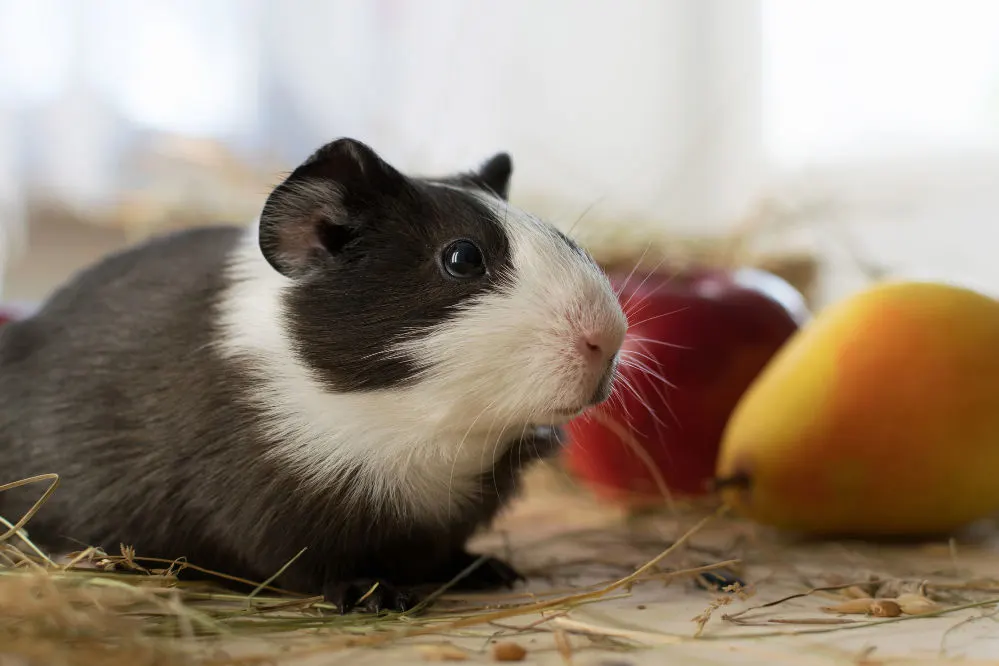
Vitamin C
Guinea pigs need about 10 mg of vitamin C per day. They usually get this through fresh veggies, Timothy hay, and pellets. But, you can help give them a little boost with a vitamin C supplement or a few apple bites as the fruit has about 4.6 mg per 3.5 oz (100g).
Vitamin C is essential for your pet’s immune system, collagen production, and growth. Like humans, without a good amount of this vitamin, your pet risks getting scurvy or other illnesses.
Fiber
Guinea pigs need a high-fiber diet for a good bacterial balance in their guts and to regulate digestion. They typically get their fiber fix from hay, grass, and leafy greens. If you notice that their toilet habits are not as regular anymore, you can aid their daily dietary fiber intake with a few apples.
An apple has about 0.08 oz per 3.5 oz (2.4 g per 100 g) of fiber. The apple skin, cores, and leaves are this fruit’s primary source of fiber, so don’t be afraid to leave a bit extra on the apple slice, just make sure not to leave any seeds.
B-Complex
B-complex is a mix of a few vitamins like vitamin B-6, thiamin, and riboflavin. These vitamins are essential in keeping your pet’s nervous system in check. You can find a high dosage of B-complex in the apple and its skin.
What types of apples can a guinea pig eat?
In general, guinea pigs can eat any type of apple on the market as long as they are fresh and raw. Apples are a good way to keep your pet’s diet varied, but try to avoid giving them too many sugary treats.
Typically, red apples are sweeter, while green apples are sourer. But both are great options. While still a safe bet, your pet may appreciate crab apples less. These small apples can be a bit more bitter (sometimes sour) than they’d enjoy.
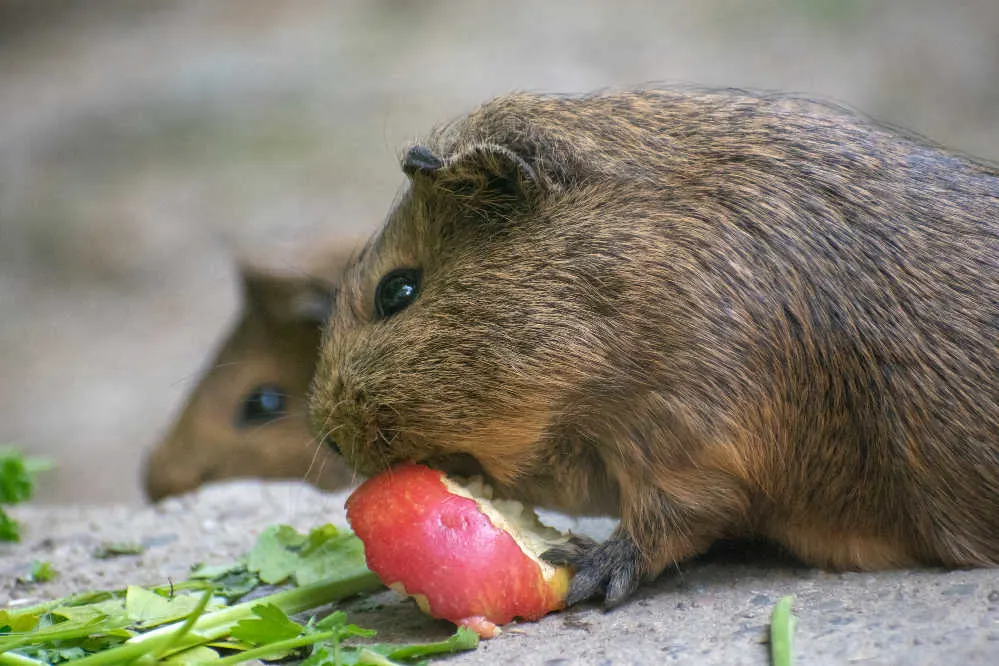
Avoid giving your pet any other form of apples besides raw fresh fruit. This means neither apple juice, apple cider vinegar, apple sauce, nor apple chips. This is because these processed fruits have higher levels of sugar and acid, which can seriously mess up their sensitive stomachs. Avoid cooking apples as well as this changes the chemical makeup. Only feed fresh, raw apples.
FAQs about feeding guinea pigs apples
Can baby guinea pigs eat apples?
Newly born guinea pigs’ main source of nutrition should be their mother’s milk, pellets, and hay. However, as they become a bit older, you can slowly start to introduce some leafy greens, fruits, and fresh vegetables into their diets — including apples.
However, since they’re still small, they have a greater chance of getting their stomach upset from eating too many apple pieces. Whereas adult guinea pigs should only get a small number of apples, babies should get an even smaller amount.
Can guinea pigs eat green apples?
Yes. Guinea pigs should have no problem eating green sour apples. Because of their sour taste, they have a higher acidity level than other apples. However, this doesn’t affect their benefits too much.
They still have a good amount of nutrients compared to red or yellow apples and may actually be slightly better for your pet. The main nutritional difference between red and green apples is the lack of sugar in Granny Smiths. So this is a somewhat healthier way to go.
But it is essential to note that, because of the high acidity level compared to a red apple, too much of these can cause stomach problems. It’s best to mix things up with an equal mix of different apples for your cute pet.
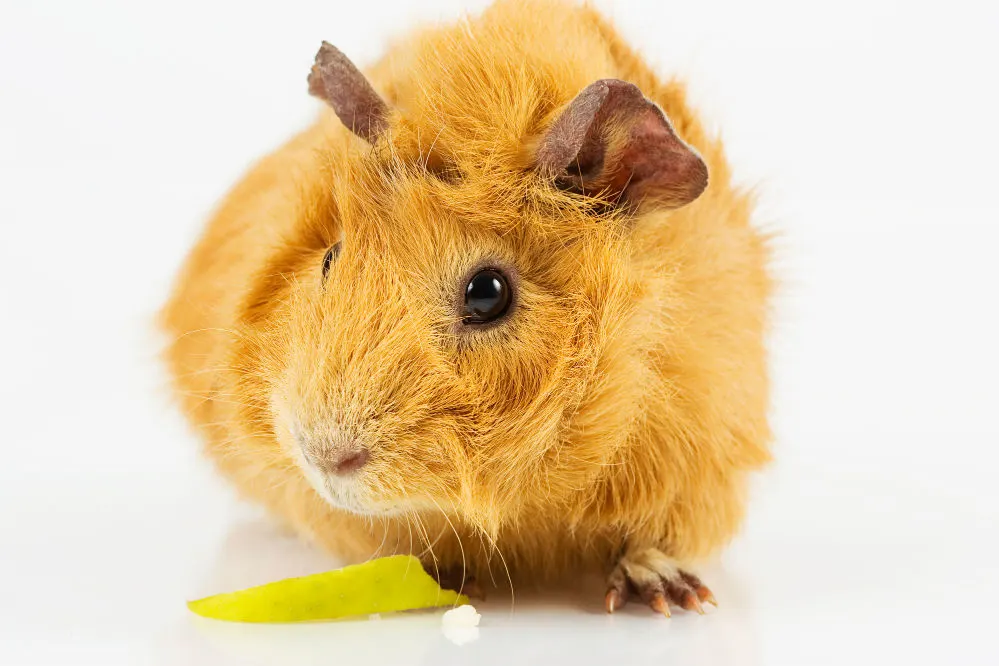
Can guinea pigs eat apple peels?
A bit of apple skin in your pet’s diet won’t harm them. In fact, it is a great source of fiber. Apple peels have about 50% more nutrients than the inside of the fruit.
Try to limit their intake, though, as too much fiber can cause diarrhea or loose stool, which is not good. Keeping the skin on their apple slices or a bit of the skin should be enough for them.
Before feeding your furry pet any apple peels, ensure you’ve prepared them well. Of course, organic fruits are the best option for your piggies, but non-organic will do too. Ensure you thoroughly wash the fruits and remove any waxy residue before serving them.
Can guinea pigs eat apple seeds?
The main concern many guinea pig owners have surrounding apple seeds is the possibility of them getting stuck in their pet’s teeth or throat. However, you can rest easy as this is very unlikely to happen.
A bigger concern might actually be about what’s in an apple seed instead. Apple seeds contain a small amount of a naturally occurring toxin called amygdalin. Once you bite or ingest amygdalin, it turns into cyanide.
Now, there is no need to call poison control if our furry friends accidentally eat one or two seeds. These are minimal amounts of cyanide that won’t cause significant harm.
That said, it is better to be safe than sorry, so don’t hesitate to remove these pips. If your pets regularly eat more than a few, it can make them sick.
Can guinea pigs eat apple cores?
Yes. Guinea pigs can eat a bit of the apple core, but try to remove as many seeds as possible before serving them up. The center actually has many essential nutrients, vitamins, and fiber that your pet can benefit from. Gnawing on an apple core may also benefit their oral health.
Rodents’ teeth can grow extremely fast and continue growing for their whole life. A guinea pig’s teeth grow up to 0.03–0.07 inches (1–2 mm) per week and about 2.9 inches (7.5 cm) a year. However, the ideal length for their teeth is only about 0.5 inches (1.5 cm).
That is why they need to constantly be gnawing on something (like wooden blocks) to shorten it. Apple cores are also a good thing for them to gnaw on. These crunchy bits of an apple are eco-friendly chew toys for your pet that helps keep their teeth in tip-top shape.
Final thoughts on whether guinea pigs can eat apples
While your guinea pig should get a healthy amount of fresh fruits and vegetables, not all produce is good for them. That is why it is essential to do your homework before figuring out what is safe for them to ingest.
You may see a bowl of juicy red apples and think it looks like a good treat for your beloved pet, and you’re right! Apples have great nutritional value for your guinea pig and make a good occasional treat.
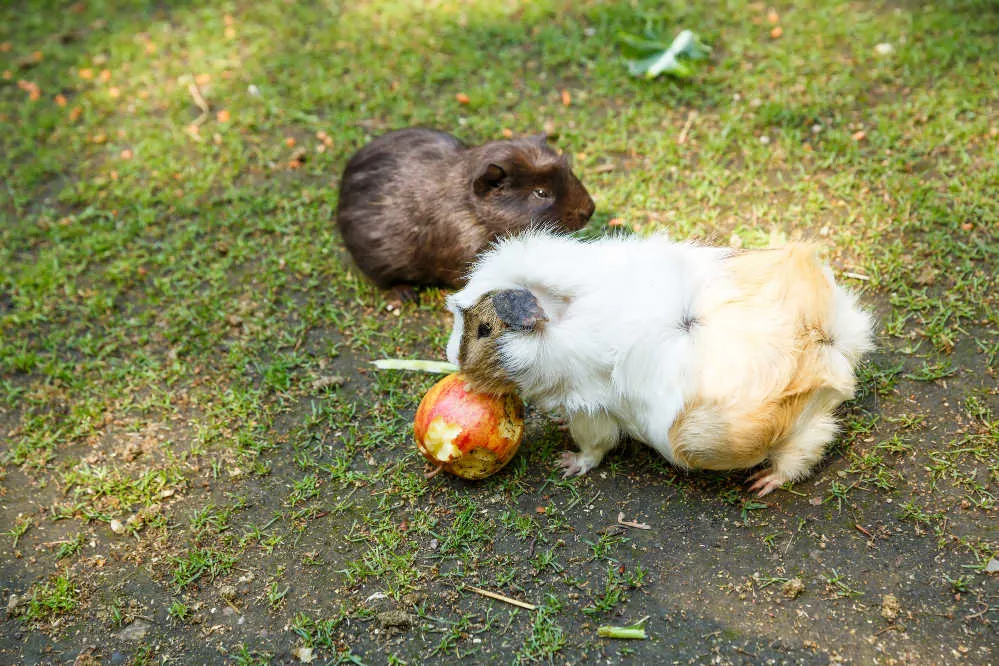
Well done on completing step one in your quest to find answers to your small animal’s dietary needs. But rest assured, your pet will not only thank you for giving them this sweet treat but may benefit from it in the long run too.
Are you interested in finding out more about how to keep your guinea pigs’ home the most comfortable place for them? Find out how to set up a guinea pig cage with fleece to keep them snug.
Steph Dyson is a travel journalist by trade but a lover of all small pets. She’s been a pet mum to everything from gerbils to guinea pigs, rabbits to hamsters, and fish to dogs of all shapes and sizes. She wants to share her years of experience with small pets and make Small Pet Guides the go-to website for pet owners seeking information and care advice.

